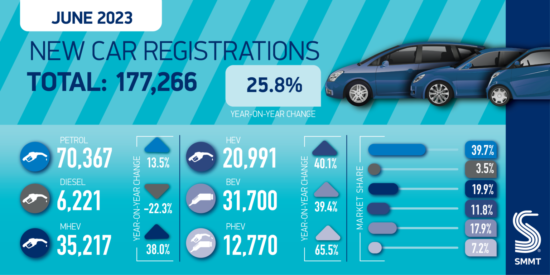Buoyant new car sales in June as SMMT calls for VAT cut on public charging

The new car market grew 25.8 per cent in June with 177,266 vehicles registered, according to the latest figures from the Society of Motor Manufacturers and Traders (SMMT). The June performance marks the 11th consecutive month of growth as the industry gradually overcomes the pandemic-induced supply chain shortages that constrained production for much of the previous two years. With waiting times easing and pent-up demand being met, the sector is a rare bright spot in a gloomy economic landscape even though overall market volumes remain below pre-pandemic levels.
Growth in the month was driven predominantly by large fleet registrations, up 37.9 per cent to 92,699 units, reflecting the normalisation of supply. Private demand grew more modestly, up 14.8 per cent to 79,798 units.
Deliveries of petrol cars increased 22.7 per cent, to remain the most popular powertrain, while those of hybrids (HEVs) and plug-in hybrids (PHEVs) also rose, by 40.1 per cent and 65.5 per cent respectively. Diesel registrations were down -13.5 per cent. Battery electric vehicle (BEV) registrations, meanwhile, grew again, with the segment up 39.4 per cent as 31,700 buyers chose to get behind the wheel of a zero emission car – 17.9 per cent of the total market. It is business and fleets, however, rather than private buyers, that continue to drive this growth, thanks to the attractive fiscal incentives on offer. Although manufacturers are offering a range of BEV deals for private buyers, including flexible subscription models and attractive finance rates, more could be done by other stakeholders to make purchasing even more compelling.
Almost a million (949,720) new cars joined UK roads in the first six months of 2023, with total registrations up 18.4 per cent and BEV uptake at record levels with 152,968 deliveries so far this year – some 13 times greater than the same period in 2019. BEV market share for 2023 is now 16.1 per cent but, with a zero emission vehicle mandate requiring 22 per cent BEV registrations per manufacturer due to come into force in less than six months’ time, more needs to be done to accelerate the transition.
Given that recharging an EV at home can offer a 60-70 per cent cost per mile saving compared with refuelling a petrol or diesel vehicle, the industry is calling for a cut in VAT on public charging to help quicken uptake. Drivers able to charge at home pay just 5 per cent VAT to power up their EV, compared with 20 per cent for those without access to a driveway or designated private parking space who are reliant on the public network. VAT equity would make switching to an electric vehicle feasible for more people regardless of home ownership or property status.
Mike Hawes, SMMT Chief Executive, said: “The new car market is growing back and growing green, as the attractions of electric cars become apparent to more drivers. But meeting our climate goals means we have to move even faster. Most electric vehicle owners enjoy the convenience and cost saving of charging at home but those that do not have a driveway or designated parking space must pay four times as much in tax for the same amount of energy. This is unfair and risks delaying greater uptake, so cutting VAT on public EV charging will help make owning an EV fairer and attractive to even more people.”
NFDA comment
Sue Robinson, Chief Executive of the National Franchised Dealers Association (NFDA), which represents franchised car and commercial vehicle retailers in the UK, said about the latest figures: “It has been a strong first half of the year for new vehicle sales, up 18.4 per cent on the first half of 2022, driven by overall resilient demand. Supply side constraints are still prevalent for certain manufacturers, but on the whole, retailers are noticing consistent improvement for showroom stock and wait times are gradually reducing.”
Plug-in hybrid (PHEVs) registrations increased by 65.5 per cent to 12,770 units, and hybrids (HEVs) followed with growth of 40.1 per cent to 20,991 units. There are now 152,968 registered BEVs on the road in 2023 compared to the 115,249 at the same point last year, a 1.7 per cent increase.
With sales of electric growing, diesel fell from 8,003 units to 6,221 (-22.3 per cent), but petrol has risen from 62,005 units to 70,367 units (13.5 per cent).
Robinson added: “Ongoing economic turbulence, including rising interest rates and inflation is impacting consumer spending power. Price parity between EV and ICE is still far too wide which has the potential to become a problem on the road to 2030. It is imperative Government does not lose focus on its climate commitments and introduces more financial incentives for the general public to support affordability of EVs and enabling an efficient and fully functional charging infrastructure.
NFDA members that have received their Electric Vehicle Approved (“EVA”) accreditation are continuing to help with the green transition the best they can, acting as vital information hubs for customers looking to make their transition to electric and the newest range of products to suit the motorists’ needs.”


 GB Tyres
GB Tyres
Comments